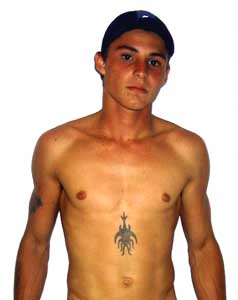
• Tell Others
|
Online Resources • Shopping • Weather • News • Exchange Rates • Translation Service • Tides • Time & Date • Surf Reports • Water Temps • Wave Heights • Satellite Images • Links • Phone Numbers • Zooming Maps |
|
• Contact Us • Newsletter |
Madrigal vs. Pipasa

Costa Rica's most prolific poultry producer, Pipasa, has been slapped with a surprise lawsuit alleging discrimination, human rights violations and other damages for refusing to hire fledgling Quepos artist Kenneth Madrigal because of tattoos on his right forearm and hand. The case will likely attract attention from human rights watchers and tattoo enthusiasts alike since its filing with Sala IV, Costa Rica's highest constitutional court.
Madrigal applied for a packing job at Pipasa, last December in an effort to fund his art studies. Pipasa is a subsidiary of Rica Foods, the Costan Rican food giants who also own As de Oros. The Pipasa poultry processing plant desperately needed left-handed workers and Madrigal felt he was perfect for the job. "I was not going to work with the public, only with chickens. How can a tattoo scare a chicken?" questions eighteen-year-old Madrigal, "Then they told me I could not work there because I might be infected."

Representing Madrigal is Quepos attorney, Mariela Jiménez. According to Jiménez, Pipasa's actions put Mr. Madrigal and all other Costa Ricans with tattoos into one class of people, and then discriminates against them. "What would the courts think if Pipasa arbitrarily decided not to hire women over forty, or not to hire gay people?" Jiménez laments. She points out that Costa Rica's constitution protects against such discrimination as do international treaties that further obligate Costa Rican businesses. Jiménez thinks Madrigal will easily win his case because of eye witness testimony and other hard evidence. "Should he lose in Costa Rica, which is hard to imagine," Jiménez predicted, "Kenneth would win overwhelmingly in an appeal to the Inter-American Court of Human Rights."
In his legal complaint against Pipasa, Madrigal seeks damages from an unnamed physician who reportedly reviewed his employment application inside an office, and with no physical examinations, medical tests or interviews, determined Madrigal's tattoos to be a health risk. "How could the doctor know if I was infected with something if he never even looked at me or took my blood?" Madrigal laments. Madrigal says he suffered a deep depression after being rejected by the company and felt he could never work again because everyone would think he was infected with diseases and because he would always be discriminated against. "How would you feel if a doctor for a big company like Pipasa on a whim decided that your life was worth nothing?" he asks. "I felt fine at the time, but according to them I was too sick to pack a chicken. That doctor had no right to be practice medicine like that."
Dr. Tatiana Romana, a renowned dermatologist in private practice, says tattoos are safe when done correctly. She ponders, "Why would job screeners pick a tattoo as a potential route for a pathogen and not screen applicants for more obvious and serious risk factors like receiving a blood transfusion before the late 1980's or unprotected extra-marital sex with multiple partners? In my opinion Pipasa's policy is purely discriminatory against people with tattoos and has absolutely no scientific basis. Considering that Pipasa is such a large chicken processing company and they don't understand basic science, that's sad and worrisome for the Costa Rican people."
Madrigal is planning a protest and news conference in November in front of Pipasa's headquarters. Those who cannot attend can help in another way by writing the investor relations department of Rica Foods, Pipasa's publicly traded owners, and letting them know how you feel.